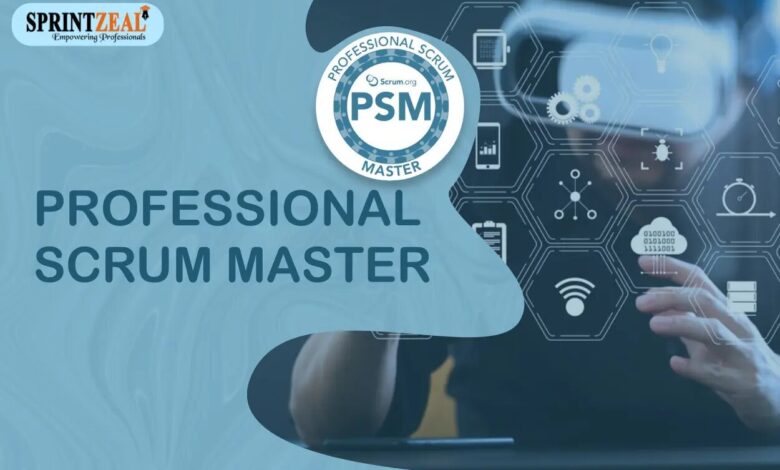Unlocking the Power of Agile: Professional Scrum Master (PSM) Certification Training Course

In the ever-evolving world of project management, the Agile methodology has emerged as a game-changer, offering flexibility, efficiency, and enhanced collaboration. At the heart of this revolution is the Scrum framework, and at the helm of a successful Scrum team is the Scrum Master. The Professional Scrum Master (PSM) certification, offered by Scrum.org, is a testament to one’s expertise in this crucial role. Here’s why enrolling in a PSM certification training course could be your key to mastering Agile project management.
Understanding the Role of a Scrum Master
A Scrum Master is much more than a project manager. They are the facilitators, coaches, and champions of Agile principles within a team. Their primary responsibility is to ensure that the team adheres to Scrum practices, removes obstacles, and fosters an environment conducive to high performance. The PSM certification validates that a professional not only understands Scrum concepts but can also apply them effectively in real-world scenarios.
Why PSM Certification Matters
- Career Advancement: In today’s competitive job market, having a PSM certification sets you apart. It signals to employers that you have a deep understanding of Scrum and are capable of leading teams to deliver exceptional results. Certified Scrum Masters often find themselves with better job opportunities and higher salary prospects.
- Enhanced Team Performance: A well-trained Scrum Master can significantly boost a team’s productivity and morale. By facilitating efficient Scrum events and removing impediments, they ensure that the team remains focused on delivering high-value products.
- Professional Recognition: The PSM certification is recognized globally. Holding this credential demonstrates your commitment to continuous improvement and mastery of Scrum, earning you respect and recognition among peers and within the industry.
What to Expect from a PSM Training Course
The PSM training course is designed to provide an immersive learning experience, covering both theoretical concepts and practical applications of Scrum. Here’s a glimpse into what the course typically entails:
- Introduction to Scrum: Gain a comprehensive understanding of the Scrum framework, including its roles, events, and artifacts. Learn how these elements work together to create a robust project management process.
- Scrum Theory and Principles: Delve into the empirical process control theory that underpins Scrum, emphasizing the importance of transparency, inspection, and adaptation.
- The Scrum Master Role: Explore the responsibilities of a Scrum Master in depth. Learn how to coach teams, facilitate Scrum events, and act as a servant leader.
- Scrum Events and Artifacts: Study the key events in Scrum (Sprint Planning, Daily Scrum, Sprint Review, and Sprint Retrospective) and understand the purpose of critical artifacts like the Product Backlog and Sprint Backlog.
- Facilitation and Coaching Techniques: Develop skills to effectively facilitate team discussions, resolve conflicts, and guide teams toward self-organization and continuous improvement.
- Scaling Scrum: Learn strategies for applying Scrum in larger projects and across multiple teams, ensuring consistent and effective delivery in complex environments.
Preparing for the PSM Exam
The PSM exam is a rigorous test of your knowledge and understanding of Scrum. To prepare effectively, candidates should:
- Study the Scrum Guide: This official document is the cornerstone of Scrum knowledge. Thoroughly understanding it is crucial for success in the exam.
- Practice Assessments: Utilize the practice assessments available on Scrum.org to get a feel for the exam format and identify areas where you need improvement.
- Engage in Practical Application: Apply Scrum principles in real-world projects to gain hands-on experience. This practical exposure is invaluable.
- Join Study Groups: Participate in study groups or online forums to share insights, ask questions, and learn from the experiences of others.
- Attend a Structured Training Course: Enroll in an accredited PSM training course for guided learning and expert advice.
Conclusion: Your Path to Agile Excellence
The Professional Scrum Master (PSM) certification is more than just a credential; it’s a steppingstone to becoming a proficient leader in Agile project management. Through comprehensive training, you’ll gain the knowledge, skills, and confidence to lead Scrum teams effectively and drive projects to successful completion. Whether you’re looking to enhance your career prospects, improve team performance, or achieve professional recognition, the PSM certification training course offers the pathway to Agile excellence. Embrace the opportunity to become a certified Scrum Master and unlock your potential in the dynamic world of Agile project management.


